Newsletter: GL Announces MC-MLPPP Conformance Tester
Welcome to another October 2012 issue of GL's Newsletter providing information and insight into our latest MAPS MC-MLPPP Conformance Tester software.
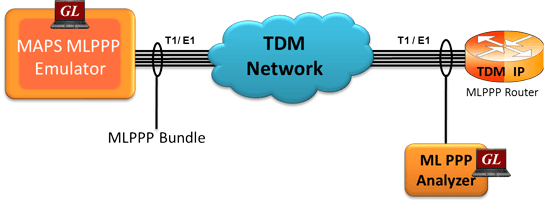
Overview
PPP (Point-to-Point Protocol) is a data link protocol like HDLC used to reliably transmit information (in frames) from point A to point B. It is commonly used by ISPs, DSL modems, and routers to transmit IP packets over WAN links (T1, E1, T3, E3, DSL, Ethernet, and ATM transmission lines).
Multiple PPP links can be combined to form a Multi Link PPP (ML-PPP) to achieve greater bandwidth. For example 5 T1 lines can be shared to get 5x the bandwidth of a single T1 line. In this case, the transmitter fragments packets and transmits over separate T1 lines. At the receiver, the fragments are assembled in the right order to reconstruct the packet. Whether PPP or ML-PPP, a single packet is transmitted completely (fragmented or not) and cannot be interrupted. Multi-Class Multi Link PPP permits interruption of one packet transmission by another, and then resumption of the original.
GL's MAPS™ (Message Automation and Protocol Simulation) platform is a general purpose Protocol Emulator for various protocols encountered in the telecom space. MC-MLPPP is one such advanced protocol simulator/tester for Multi Class, Multi Link, PPP protocols over TDM (T1 E1). The tester can simulate a complete PPP or MLPPP link between two peers, with MLPPP signaling conforming to IETF specifications.
MAPS™ MLPPP supports testing network elements, error tracking, regression testing, conformance testing, and load testing/call generation. The test tool can run pre-defined test scenarios against MLPPP test objects in a controlled & deterministic manner. The test tool also incorporates the flexibility to modify call parameters & message contents (arbitrary manipulation of messages, information elements and message sequence on the different protocols).
MAPS™ MLPPP conformance scripts are suitable for conformance tests and functional tests, where test objects can be accurately, reliably and comfortably validated for compliance with IETF standard. It is suitable for manufacturers, network operators and service providers to address all stages of the development cycle, regression testing through to type approval, acceptance testing.
Typical Call Flows
A typical signaling exchanged between two peers in PPP network is as shown below.
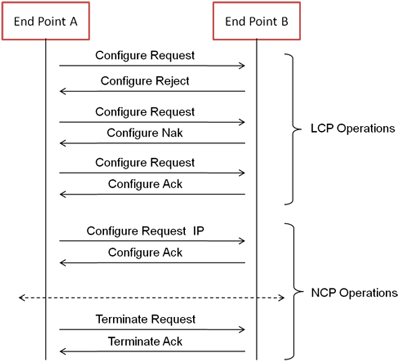
Typical MLPPP Negotiation Operations
Testing the Peer Endpoints (Switch or Router)
Call Generation
Call Generation option allows the user to simulate outgoing communications initiating the call by sending call control messages using proper scripts and profiles. The profile allows necessary parameters of call control messages to be changed during run-time.
The MAPS™ MLPPP acts as Caller and initiates the call flow by sending Configure-Request to the other peer end (DUT). The DUT on receipt of a Configure-Request message sends a Configure-Ack message in response.
Call Reception
Call generated from the other peer end can be automatically detected using call reception window by pre-setting the required scripts in the Incoming Call Handler window.
MAPS™ MLPPP is configured to act as the receiving endpoint, which receives the Configure-Request message with magic-number from the peer end and replies with the valid Configure-Ack. The test script is considered to be successfully executed, when the DUT sends the Configure-Nak suggesting new Magic Number.
Main Features
- Performs MC-MLPPP as well as PPP simulation over TDM (T1/E1)
- Supports LCP with the following negotiation options.
- PPP options: MRU (Maximum Receive Unit), ACFC (Address and Control Field Compression), PFC (Protocol Field Compression), and Magic Number.
- MLPPP Options: MRRU (Maximum Received Reconstructed Unit), Short Sequence Number Format, Long sequence header format, Endpoint Discrimination, and Multi-class option.
- Multi-Class Options: Multilink Header Format.
- Supports the following NCPs -
- IPCP - RFC 1332 (The PPP Internet Protocol Control Protocol) and RFC 1877 (PPP Internet Protocol Control Protocol Extensions for Name Server Addresses) standards.
- PPPMuxCP - RFC 3153 (PPP Network Control Protocol for PPP Multiplexing) standard.
- Supports IP compression negotiation option conforming to RFC 3544.
- Supports full or fractional timeslots for PPP Link.
- Ideal solution for automated testing using command line scripts.
- Supports customization of call flows and message templates using Script editor and Message editor.
- Scripted call generation and automated call reception.
- Provides protocol trace with full message decoding, and graphical ladder diagrams of call flow with time stamp
- Script based & protocol independent software architecture.
- Provides call statistics with associated captured events and error events during call simulation
Call Statistics
MAPS™ supports Bulk Call Simulation and Stress/Load Testing capabilities through Load Generation feature. All call handling scripts (irrespective of the type of the functions) are assessed by MAPS™ to provide statistical information about Total Calls, Active Calls, Completed Calls, Passed Calls, Failed Calls, and Simultaneous Calls/Sec (CPS), and Calls/Sec . It is also possible to characterize the statistical information under different groups of call handling scripts under a unique heading.
For comprehensive information on the application, you can refer to the MAPS MC-MLPPP Conformance Tester web page.
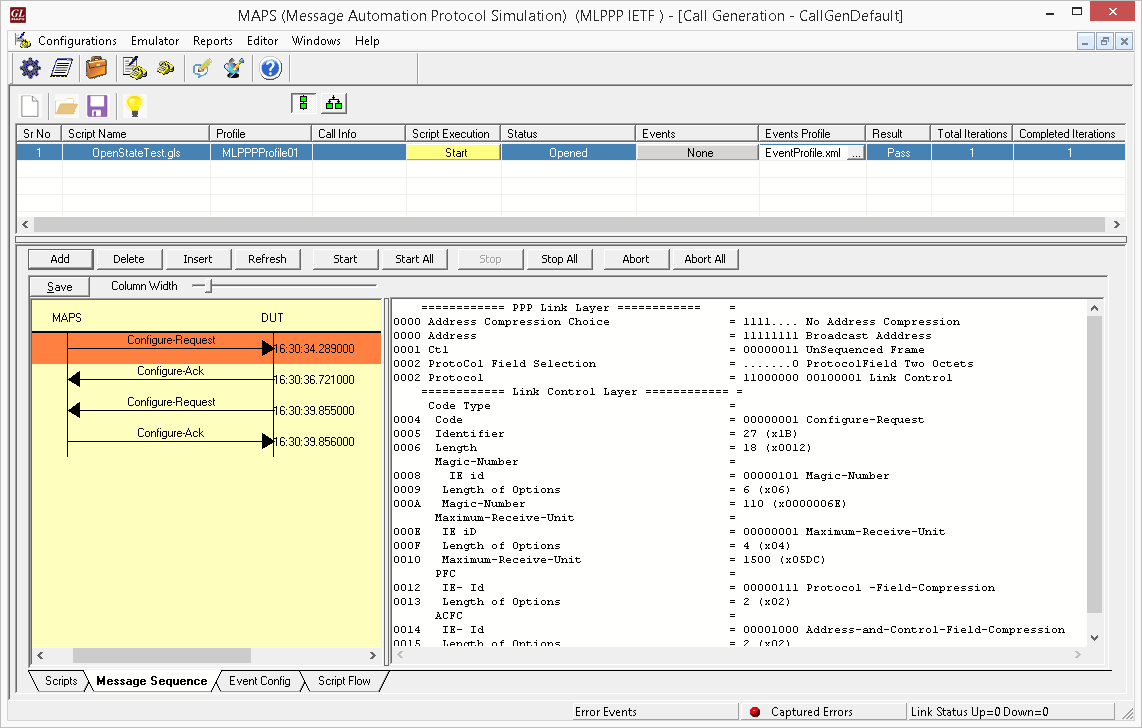
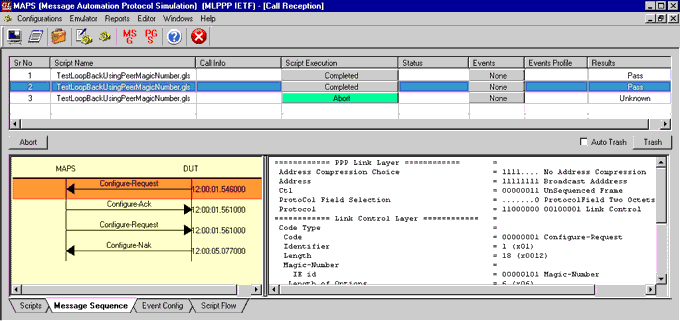
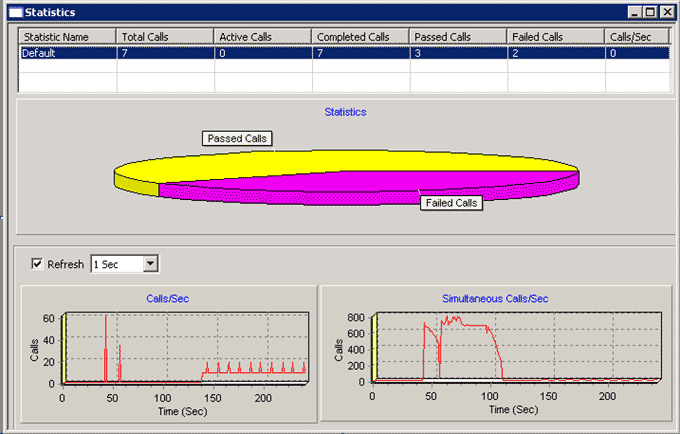
 Back to Newsletter Index Page
Back to Newsletter Index Page